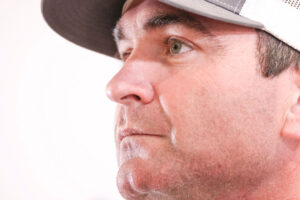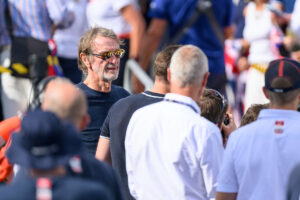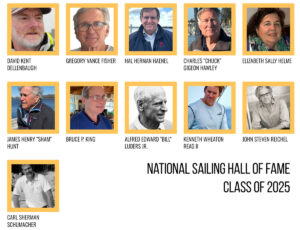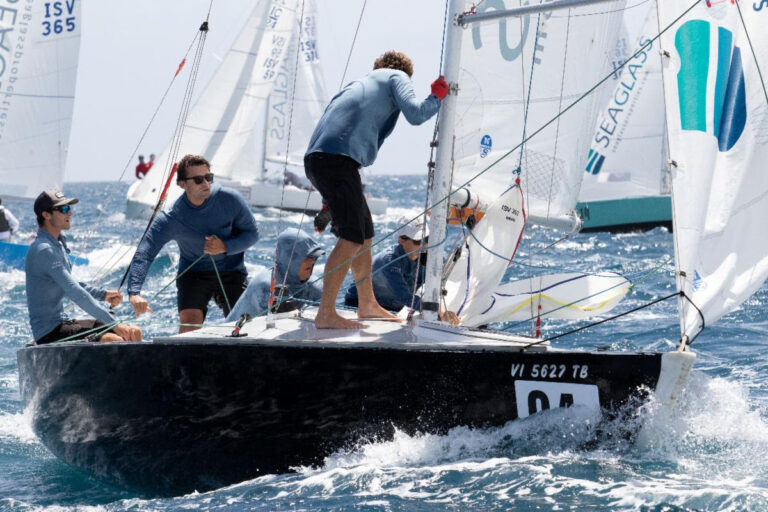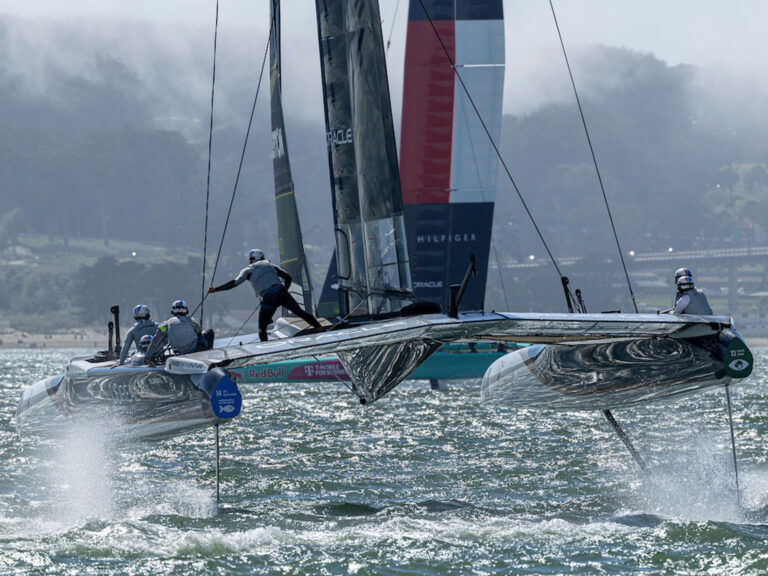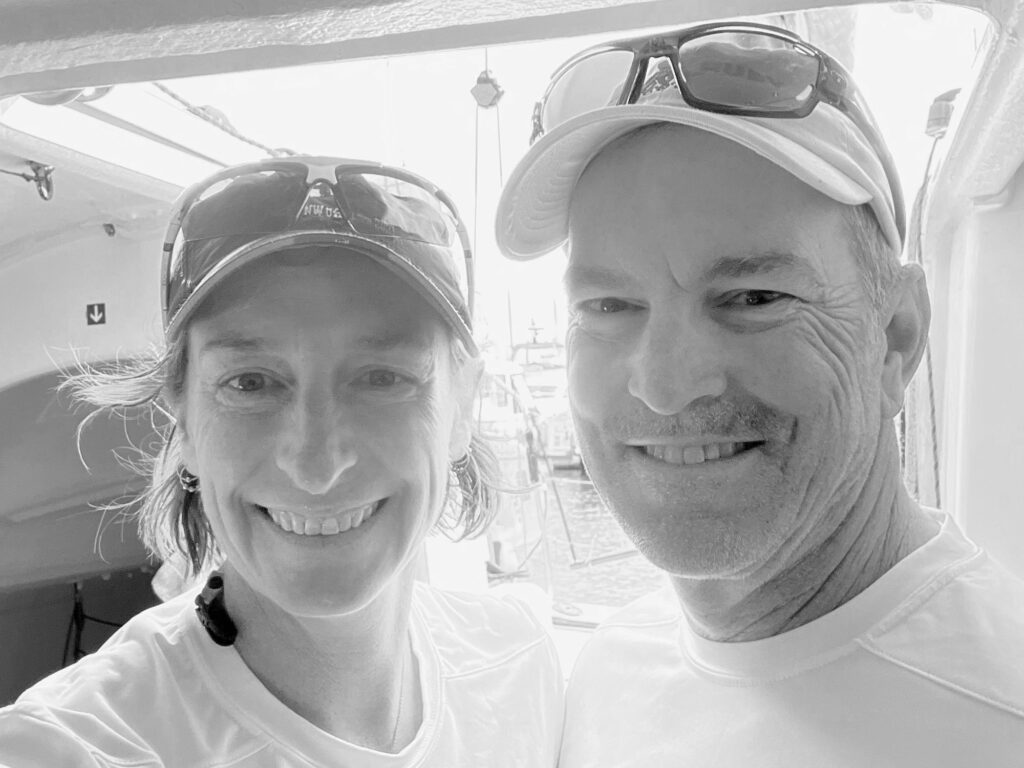
Type II Fun: An experience that’s miserable in real time but great once it’s astern. It’s also the kind of fun that Christina and Justin Wolfe, of Orcas Island, Washington, gravitate toward.
Case in point: Christina, the 2023 Rolex Yachtswoman of the Year, was the top female finisher in 12 triathlons inside of 12 months, and Justin has won an Ironman. He also beat Lance Armstrong on paper in a time trial, but that’s a story for another space. Together, sailing doublehanded, they crossed the Atlantic, raced to Hawaii (three times), and finished second overall in the 2023 Rolex Middle Sea Race.
These accomplishments didn’t arrive without time spent dwelling inside personal pain caves. For the Wolfes, the lessons mastered on grueling runs, swims, endless road-bike rides and training sessions have yielded a rock-solid foundation for serious offshore racing.
For example, hours into a rough-and-tumble 2023 Rolex Fastnet Race, Christina cracked multiple ribs but kept racing. “I helped her grind,” Justin says, “but that was it.”
The Wolfes pressed Red Ruby, their co-owned Jeanneau Sunfast 3300, to fourth place overall in IRC 2 (98 boats) and seventh place in the IRC Two Handed class (106 boats).
Better still, Christina was awarded the Fastnet Race’s Maite de Arambalza Trophy for the fastest female skipper in the IRC division.
“We very much treat a lot of the races that we do as endurance events,” Christina says. “This isn’t to say that it’s fun all the time.” She cites cyclist Greg LeMond’s famous quote about how things never get easier, you just go faster. “It’s something we’re more used to—that feeling of being uncomfortable.”
The Wolfes met in 1995 when Justin bought a Carl Schumacher-designed Sonoma 30. He was teaching sailing at Seattle Yacht Club, where the University of Washington sailing team practiced. She was an undergrad at UW, earning a degree in business and finance, and gaining dinghy-racing expertise on the team. He wanted to race in the local two-handed “Jack and Jill” series and, as he says, “She was the best Jill around.”
A deep sailing and life partnership formed. Since then, they’ve sailed 95 percent of their miles together and two-handed.
They’ve also spent years in Stony Brook, New York; Norman, Oklahoma; and Austin, Texas. Justin studied meteorology in grad school at Stony Brook University before working as a weather router for a commercial-shipping company, and then designing large-scale wind farms. Christina, who holds a Master’s from Stony Brook in biology, worked at the University of Oklahoma and, later, at a large environmental nonprofit. These were career-building years, but the Wolfes filled them with Type II fun. “I ended up becoming a strong cyclist because I was riding around with two dudes, trying to hold their wheels and not get dropped for a 100-mile ride,” Christina says.
Serious sailing reemerged in 2012. The Wolfes were living in Madrid when they bought Shearwater, a J/120, in Annapolis, and doublehanded it to Portugal. They relocated to Austin in 2013 and, in 2014, bought a Schumacher 28, which they raced on nearby Lake Travis. The pair doublehanded the 2014 Pacific Cup aboard Shearwater, and they returned in 2016—again doublehanded—with their Schumacher 28. (Note: They raced doublehanded to the Aloha State again in 2022 aboard Raku; see below.)
“Our strength is that we don’t have individual strengths,” says Justin of their respective onboard roles. “So, we’re not reliant on one person to take care of some aspect that will fall apart if that person can’t do it.”
Christina agrees: “We’ve been racing different sports for so long, and one of the approaches—especially with triathlon—that we took was to train the weakness so that, across the board, you don’t have any holes.”
An example of this, she says, was that years ago, the team started giving her a ton more tiller time. “Now, when we race, it’s pretty seamless, where we are both all over the boat, transitioning from one thing to the other,” she says.
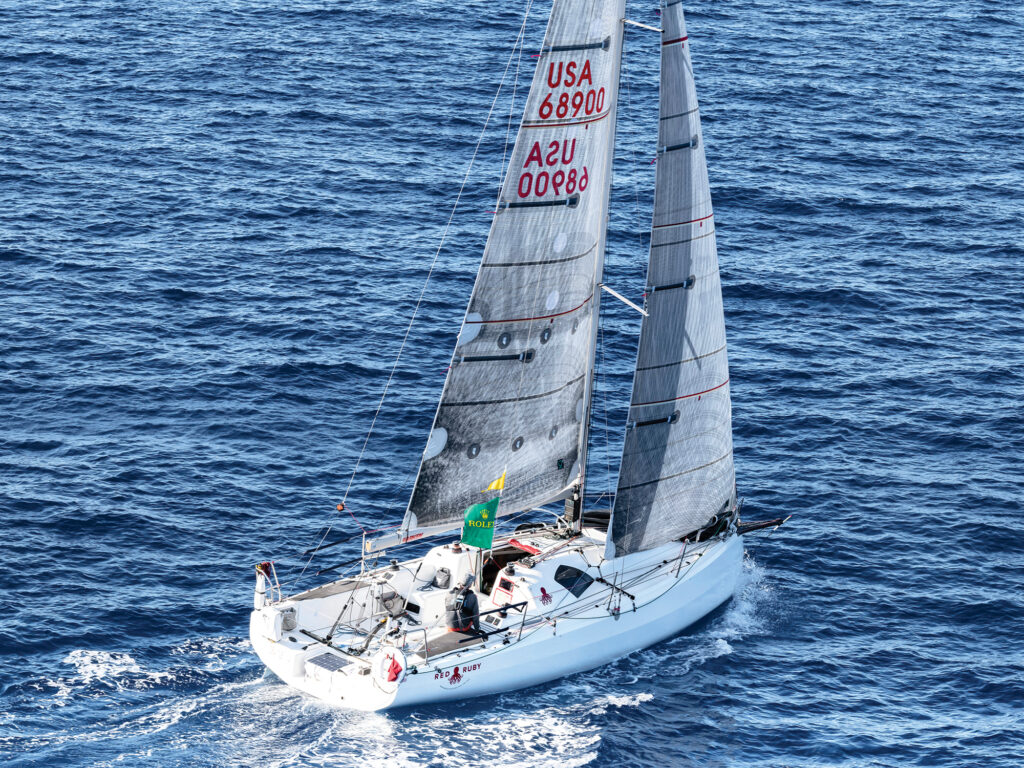
Forever on the move, in 2017, the Wolfes relocated to Orcas Island, Washington, purchased a solar-power business, and started winning local races. And when the pandemic hit, they found themselves island-bound with Raku, their new-to-them J/111, and a community of sailors, including Ron Rosenberg, a multitime world champion and Olympic-level coach. Rosenberg was spooling up some local coaching, including with the Pacific Northwest’s now 40-plus-strong “J/Pod” of J/70s, which the Wolfes joined.
“They’re both such humble, sincere, give-it-your-all athletes, they quickly progressed,” Rosenberg says. He describes the two as mentally and physically high-functioning sailors who value careful race preparation. “They consistently prove that by working together, their results are much greater than what they could achieve alone.”
At Rosenberg’s suggestion, the Wolfes applied—and were accepted—to represent the US at the 2021 Mixed OffshoreDoublesWorld Championship. Rosenberg pulled Jonathan McKee, his longtime friend and a double Olympic-medalist and offshore veteran, into the loop. McKee coached the Wolfes for the event, including a 400-nautical-mile delivery.
“Their hunger for learning is the kind of thing you don’t see, especially in adult athletes,” McKee says. He attributes part of their rapid progression to their triathlon successes. “It sets you up well for offshore sailing, especially when it gets really tough and you have to find the reserves of endurance and mental strength.”
The Wolfes finished the Doubles Worlds in sixth place, and a fuse lit.
The team’s debriefing unfurled on Orcas Island, and the Wolfes told their coaches that they wanted to do more doublehanded racing in Europe. They also mentioned that if they had the right partner, they might purchase a boat.
McKee dispatched an email, and the three purchased Red Ruby (nee Gentoo), their Sunfast 3300, in January 2022. The plan was to share the UK-based boat for European doublehanded events, and to work together to help both teams realize greater performance.
While it’s easy to point to the awards ceremony as the moment when Type II fun morphed into real-time smiles for the Wolfes at the 2023 Fastnet Race, this doesn’t lay the mark.
“Our previous endurance events taught us how to refuel, taught us how to pace, taught us how to suffer,” Justin says, calling conditions “just fine” despite the three storms that combed their fleet. “We seem to find that the longer and the harder the race is, the better it is for us.”
Enter the 2023 Rolex Middle Sea Race—an event that friends from the UK Sunfast 3300 fleet said that they wouldn’t sail doublehanded because it demands too many sail changes.
“When I heard that, I was like—yes, that’s exactly what we want,” Justin says.
And it’s exactly what they got.
Windspeed and angles kept oscillating, putting the sail calls between the A1.5, the A2, the J1, the J2 and the code zero.
“The pacing part of that was that we just kept switching who was doing the hard part,” Justin says. “Rather than letting one of us get completely smoked, we just keep moving around. We keep switching it off before one of us gets very, very tired.”
The irony of their friends’ wisdom wasn’t lost as the two completed nine sail changes in the first 6 miles. This included badly jamming the brand-new J1 in the pre-feeder—a fix that called for a knife in the short term, followed by six hours of belowdecks work wrestling the doubled-over luff tape out of the pre-feeder track.
But, as with all tough jobs, the Wolfes kept swapping the tiller for the pliers.
“It’s a tag-team thing,” Christina says. “That’s just the approach we’ve always taken with everything, with driving, with dealing with a problem.”
This, they say, applies to both mental and physical cruxes.
“The mantra there is, we don’t let ourselves get too deep,” Justin says, adding that they’re careful to rotate jobs before frustrations build.
“It’s a process that we use that seems to work well,” Christina says.
By sunrise, the J1 was fixed and Red Ruby was in the hunt.
Mount Stromboli was erupting as they approached, but the tactical fireworks went off as the Wolfes approached Sicily’s west end. Nearby boats hugged the coastline, but Red Ruby jibed away.
This wasn’t accidental.
Justin leveraged his meteorology skills, some road-less-traveled weather models, and in-depth weather and course briefs, the latter of which was prepared by McKee and Alyosha Strum-Palerm, McKee’s doublehanded partner. (The teams swap this favor.)
“We made that decision 100 percent together,” Justin says, adding that the team makes all navigational calls in tandem. “Everything was open—it was just a joint decision that we were comfortable with.”
Four hours later, Red Ruby had banked 20 miles on the inshore boats.
“We’ve been racing different sports for so long, and one of the approaches—especially with triathlon—that we took is to train the weakness so that, across the board, you don’t have any holes.”
The Wolfes finished the 606-nautical-mile course in 4 days, 9 hours, 41 minutes, 35 seconds, winning their doublehanded class and finishing 24 seconds outside of claiming overall IRC victory. The only faster boat was a fully crewed Wally 93.
“They don’t do things based on emotion—whether it’s routing, sail selection or post-race analysis—they operate on facts, and they make good decisions,” McKee says, adding that they’re also nice people. “They aren’t just head-down; they make friends with other competitors.”
Looking ahead, the Wolfes envision two marquee events in 2024. The first is April’s Cap Martinique, which stretches from Brittany, France, to Martinique, and which they’ll race doublehanded aboard Red Ruby. Then, next winter, they plan to sail the Rolex Sydney Hobart Race two-up, either aboard Red Ruby or a chartered Sunfast 3300.
“As you get a little bit older, you start to realize how precious life is and that we don’t get do-overs,” Christina says. “This is very much an active focus that we have right now to do these sailing events. They’re really hard, but they’re bringing us a lot of satisfaction, amazing relationships, and they’re definitely fun—after they’re over.”

